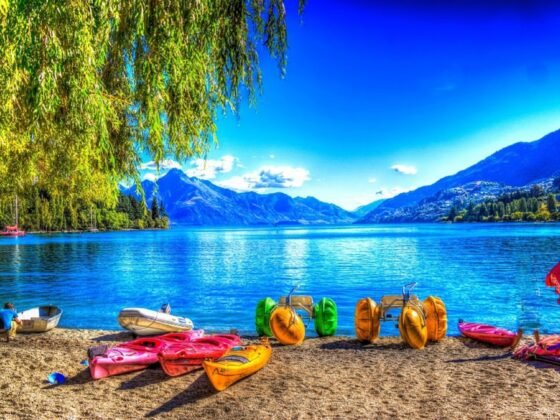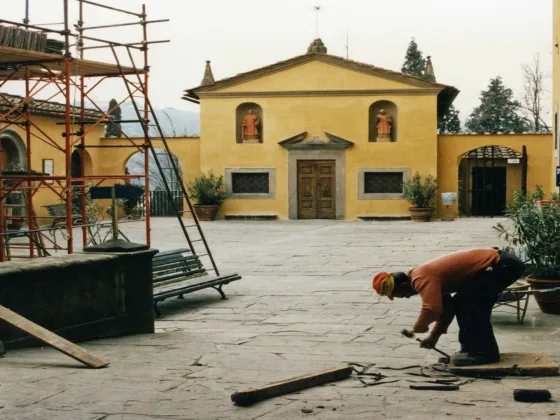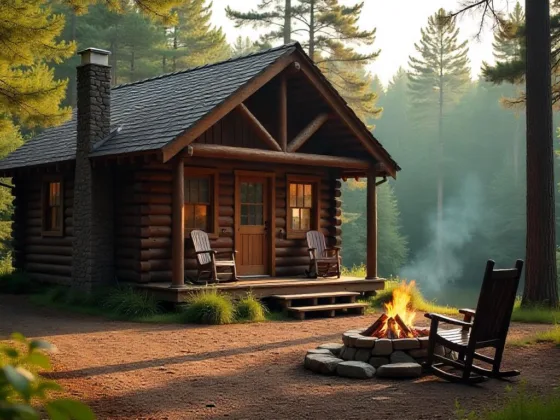Table of Contents Show
Have you ever dreamt of living amidst the dazzling lights and dynamic energy of the world-famous Las Vegas Strip? The thought of residing in the Entertainment Capital of the World can be both alluring and daunting.
Beyond the glitz, glamour, and casinos lies a city with its own unique advantages and challenges. From the unexpected affordability and outdoor adventures to considerations about desert heat and water resources, Las Vegas is a mosaic of experiences waiting to be explored.

Understanding the complete picture is crucial if you’re attracted to the prospect of no state income tax, the vibrant nightlife, or the sunny climate. And if you’ve been contemplating a move, or just curious about life in this iconic city, it’s essential to weigh the benefits against the potential drawbacks.
Dive into our comprehensive guide on the pros and cons of moving to Las Vegas, and equip yourself with the knowledge to make an informed decision about your next big move.
Pros of Moving to Las Vegas
1. Affordability:
When you think of Las Vegas, opulent casinos and grand shows might come to mind, but the city is surprisingly affordable for residents. Historically, the cost of living in Las Vegas has been significantly lower than many other major US cities, particularly in comparison to West Coast cities like Los Angeles and San Francisco.
In particular, although on the rise, according to Matiah Fischer, Las Vegas Realtor and the Founder of All Homes Las Vegas, housing prices offer much better value for money. This means you can get a larger home with more amenities for a fraction of what you’d pay elsewhere.
2. No State Income Tax:
Financial benefits extend beyond just the cost of living. One of Nevada’s most significant perks is the absence of state income tax. While you’ll still have to pay federal income tax, skipping the state tax can lead to considerable yearly savings. This benefit is especially advantageous for entrepreneurs, retirees, and high-income earners.
3. World-Class Entertainment:
Living in Las Vegas means having world-class entertainment at your fingertips. The city is constantly buzzing with activity. Whether you’re a fan of concerts, theater productions, magic shows, or comedic performances, there’s always something happening. And it’s not just the big-ticket shows; local venues, bars, and clubs also host many acts catering to all tastes and preferences.
4. Growing Job Market:
While Las Vegas is traditionally known for its hospitality and entertainment sectors, the job market is diversifying. There’s been a noticeable rise in industries like technology, manufacturing, and distribution, offering residents a wider range of employment opportunities. Additionally, with the influx of tourists and conventions, jobs in the service sector are always in abundance.
5. Diverse Population:
The allure of Las Vegas has drawn people from all corners of the globe, resulting in a vibrant mix of cultures, languages, and traditions. This diversity is reflected in community events, food, music, and even business opportunities. For those seeking a cosmopolitan experience, Las Vegas doesn’t disappoint.
6. Favorable Weather:
For sun lovers, Las Vegas is paradise. With over 300 sunny days annually, the city offers a dry, warm climate most of the year. This is especially appealing for individuals looking to escape the cold winters of the north or the unpredictable weather patterns in other regions. While summers can be scorching, the heat is dry, which many find more bearable than the humid heat of southern states.
7. Outdoor Activities:
The desert landscape around Las Vegas is a playground for outdoor enthusiasts. A short drive from the city center will land you in places like Red Rock Canyon, a haven for hikers and rock climbers. Lake Mead, the country’s largest reservoir, offers opportunities for boating, fishing, and water sports. If you’re into off-roading or scenic drives, the Valley of Fire State Park is a must-visit.
8. Education and Learning Opportunities:
Over the past few years, Las Vegas has been investing significantly in its educational institutions. The University of Nevada, Las Vegas (UNLV) has expanded its programs, and there’s been a push toward enhancing K -12 education in the region. Alongside formal education, the city hosts a variety of workshops, conventions, and seminars across multiple fields, allowing residents to continuously learn and grow.
9. Transportation:
Las Vegas has invested in streamlining its public transportation system, making daily commutes easier. The monorail system, in particular, is a boon for those looking to navigate the Strip. And for those with a penchant for travel, McCarran International Airport offers a multitude of flight options, both domestic and international.
10. Thriving Food Scene:
In Las Vegas, dining out isn’t just about eating; it’s an experience. The city boasts a range of culinary delights, from lavish celebrity chef restaurants to unique local eateries. Whether you’re in the mood for gourmet sushi, traditional Italian, or spicy Thai, there’s something for every palate.
Cons of Moving to Las Vegas
1. Scorching Summers:
While the year-round sunshine in Las Vegas can be appealing, the intense heat during the summer months is not for everyone. Temperatures frequently exceed 100°F (38°C) and can even approach 120°F (49°C). These extreme conditions can make outdoor activities challenging and increase home cooling costs.
2. Water Scarcity:
Nestled in the Mojave Desert, Las Vegas grapples with water scarcity issues. The city has had to implement water-saving measures, and residents are often encouraged to adopt water-efficient practices. This can influence the kind of plants you can grow and how you use water daily.
3. Crime Rate:
Certain Las Vegas areas have reported higher crime rates than the national average. While many areas are perfectly safe, potential residents need to do thorough research and possibly invest in security measures if they choose to live in or near higher-risk areas.
4. Transient Population:
With its ever-evolving entertainment and hospitality industries, Las Vegas attracts a constant influx of new residents while others move out. This transience can make it challenging for some to establish deep, long-lasting community ties or friendships.
5. Limited Cultural Depth:
While Las Vegas offers many entertainment options, critics often argue that it needs more cultural depth found in other cities. There’s a shortage of traditional arts venues like prominent museums, classical music institutions, and community theaters. Though the scene is evolving, it’s still in nascent stages compared to other major cities.
6. Dependence on the Service Industry:
The Las Vegas economy is heavily reliant on its service industry. While job opportunities abound, many of these positions, particularly in the casino and hotel sectors, may not offer the long-term career growth or stability some professionals desire.
7. Education Concerns:
Historically, Nevada has faced challenges related to its education system, ranking lower than many states regarding educational outcomes. While efforts are being made to improve the quality of K-12 education, families might need to consider private schooling or seek out specific districts with better reputations.
8. Potential for Problematic Temptations:
The ubiquity of gambling, 24-hour liquor sales, and other forms of adult entertainment can be problematic for some individuals. For those prone to addictive behaviors, Las Vegas might present more challenges than other locations.
9. Distance from Other Major Cities:
Apart from its proximity to cities in neighboring states like Los Angeles or Phoenix, Las Vegas is relatively isolated. This means that quick weekend getaways to different environments, whether it’s the beach or the forest, require more planning and longer travel times.
10. Traffic and Public Transportation:
While Las Vegas has been making strides in improving its public transport system, traffic congestion, especially around the Strip, can be problematic. Public transportation options outside of the central areas can also be limited, making car ownership almost a necessity.
11. Air Quality Issues:
Despite its open desert surroundings, Las Vegas sometimes suffers from air quality issues. Dust storms, combined with pollution from vehicles and industry, can lead to lower air quality, especially during certain times of the year.
Conclusion
So, as the sun sets over the iconic Las Vegas skyline, casting glimmers on its world-renowned Strip, one can’t help but ponder the complexities of this desert oasis.
Delving beyond the neon lights and slot machines, Las Vegas is a city of contrasts. From its surprisingly affordable living and diverse job opportunities to its blazing summer heat and water challenges, the city holds both promise and caution for potential newcomers.
For those who dream of a life filled with vibrant entertainment, warm weather, and a hint of the unexpected, Las Vegas beckons with open arms. Yet, it’s vital to balance this allure with the practical considerations that come with desert living and the city’s unique dynamics.
Whether you’re seeking an adventurous change, evaluating job prospects, or simply curious about what life might hold in the Entertainment Capital of the World, equip yourself with comprehensive knowledge. Reflect, research, and decide if the roll of the dice in Las Vegas aligns with your life’s ambitions.










